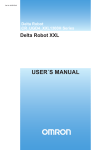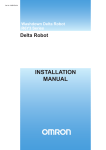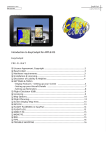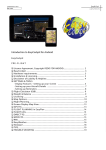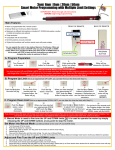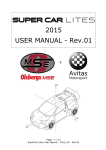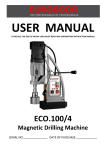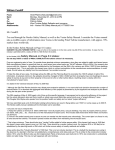Download USER´S MANUAL
Transcript
Cat. No. I199E-EN-01 Washdown Delta Robot ZX-T Series CR_UGD4_HD Series Delta Robot IP69K USER´S MANUAL CONTENTS CR_UGD4_HD User's Manual Safety Instructions 1. Attention S-1 2. Explanation of warnings and notes S-1 3. Safety information S-2 3.1 General S-2 3.2 Qualifiedpersonnel S-2 3.3 Liability S-2 3.4 Installation and operating conditions S-2 3.5 Residual risks S-2 3.5.1 3.5.2 3.5.3 3.5.4 3.5.5 Release device Transport Assembly and start-up Maintenance and repair System integrator Chapter 1 Introduction 1. Introduction 1.1 S-3 S-3 S-3 S-3 S-4 1-1 Description of the robot 1.2 Type code explanation 1-1 1-1 2. Identification 1-1 3. Part names 1-2 Chapter 2 Model overview 1. Overview Chapter 3 2-1 Installation 1. Unpacking 1.1 Unpacking the shipping box 3-1 3-1 1.2 Check the damage 3-1 1.3 Lifting and transportation 3-1 2. Mounting the robot 3-2 3. Mounting the motors, cabling and gearbox housing 3-3 3.1 Mounting the motors 3-3 3.2 Mounting the gearbox housing into the body and connecting the cables 3-4 3.3 Mounting the covers 3-8 T-1 CONTENTS 4. Assembling the secondary arms 4.1 Make an assembly 4.2 Mount the arm assembly on the robot User's Manual 3-9 3-9 3-10 5. Mounting the rotational axis on the cardan joint 3-11 6. Calibration 3-12 Chapter 4 Maintenance 1. Periodic maintenance 1.1 Springs 4-1 4-1 1.2 Ball bearing cups 4-2 1.3 Rotational axis 4-2 2. Cleaning the robot 4-4 3. Spare parts 4-4 Chapter 5 Robot settings 1. Kinematics 5-1 2. Workspace 5-2 3. Software limits 5-3 Chapter 6 Specifications 1. Basicspecifications 1.1 Cycle time 6-1 6-2 2. External view and dimensions 6-3 3. Designspecifications 6-4 3.1 Occupation area of robot 6-4 3.2 Gripper interface 6-4 3.3 Software design 6-5 3.3.1 T-2 CR_UGD4_HD Dimensions and limits 6-6 Safety Instructions Contents 1. Attention S-1 2. Explanation of warnings and notes S-1 3. Safety information S-2 3.1 General S-2 3.2 Qualified personnel S-2 3.3 Liability S-2 3.4 Installation and operating conditions S-2 3.5 Residual risks S-2 3.5.1 3.5.2 3.5.3 3.5.4 3.5.5 Release device Transport Assembly and start-up Maintenance and repair System integrator S-3 S-3 S-3 S-3 S-4 1. Attention Information in this document can change without prior notice. No part of this manual and added documentation may be copied, reproduced or translated into another language without prior written approval. Read and understand the material contained in this user's manual before you work on the CR_UGD4_HD robot for the first time. This user's manual is supposed to help you use the capabilities of the CR_UGD4_HD robot safely and properly. 2. Explanation of warnings and notes This manual uses the following safety alert symbols and signal words to provide safety instructions that must be observed and to describe handling precautions, prohibited actions, and compulsory actions. Make sure you understand the meaning of each symbol and signal word and then read this manual. DANGER THIS INDICATES AN IMMEDIATELy HAzARDOUS SITUATION WHICH, If NOT AVOIDED, WILL RESULT IN DEATH OR SERIOUS INjURy. WARNING THIS INDICATES A POTENTIALLy HAzARDOUS SITUATION WHICH, If NOT AVOIDED, COULD RESULT IN DEATH OR SERIOUS INjURy. NOTE Explains the key point in the operation in a simple and clear manner. S-1 Safety Instructions OMRON EUROPE B.V. cannot be hold responsible for any damage to the environment, to the machine or to the functioning of the machine occurred by errors or missing data in the illustrations, drawing or specifications. 3. Safety information 3.1 General Safety Instructions This ´3. Safety information´ subchapter contains information regarding working with the CR_UGD4_HD robot. Qualified personnel working with the CR_UGD4_HD robot must have read and understood the CR_UGD4_HD robot documentation, including the safety information chapter. 3.2 Qualified personnel These are people who, due there specialist training, knowledge and experience, and their familiarization with the relevant standards, are able to assess the work to be carried out and detect any potential hazards. 3.3 Liability The CR_UGD4_HD robot is build using state-of-the-art technology and in accordance with the recognized safety rules. Nevertheless, misuse of the CR_UGD4_HD robot may constitute a risk to life and limb or cause damage to the CR_ UGD4_HD robot and to other material property. 3.4 Installation and operating conditions you may only use the components in accordance with the installation and operating conditions described in the documentation. The operating conditions at the installation location must be checked and maintained in accordance with the required technical data. Within the meaning of the Machinery Directive the CR_UGD4_HD robot is an incomplete machine. Commissioning is prohibited until the usable machine or system in which the CR_UGD4_HD robot is installed meets all requirements of the Machine directive 2006/42/EC. for the CR_UGD4_HD robot you have to observe the following standards, directives and regulations: • ENISO10218-1:2011Robotsandroboticdevices-Safetyrequirementsforindustrialrobots-Part1:Robots. • ENISO10218-1:2011Robotsandroboticdevices-Safetyrequirementsforindustrialrobots-Part2:Robotsystems and integration. 3.5 Residual risks Safety and health risks arising from the robot mechanics have been reduced by means of safety technology and design engineering. However a residual risk remains, since the robot mechanics will be move by an automated control system. The following are typical warnings concerning residual risks which cannot be assigned to a specific action. The expression of safety labels is identical to the safety information. S-2 3.5.1 Release device The robot mechanics are not supplied with an release switch to control the brakes of the motors. 3.5.2 Transport The prescribed transport position of the robot must be observed. Transportation must be carried out in accordance with the transportation instructions or assembly instructions of the robot. WARNING • ONlyuSEauthORIzEDhaNDlINgEQuIPMENtwIthaSuffIcIENtlOaD-BEaRINgcaPacItytOtRaNSPORt THE ROBOT. • wEaRSuItaBlEPROtEctIvEclOthINgIfNEcESSaRy. 3.5.3 Assembly and start-up Before starting up systems and devices for the first time, a check must be carried out to ensure that the system and devices are completed and operational, that they can be operated safely and that any damage is detected. The valid national or regional work safety regulations must be observed for this check. The correct functioning of all safety circuits must also be tested. The following tests must be carried out before start-up and recommissioning. It must be ensured that: • therobotiscorrectlyinstalledandfastenedinaccordancewiththespecificationsintheassemblyinstructions. • therearenoforeignbodiesorloosepartsontherobot. • allrequiredsafetyequipmentiscorrectlyinstalledandoperational. WARNING • awRONgINStallEDROBOtMaythROwOffhISaRMS. • wEaRSuItaBlEPROtEctIvEclOthINgIfNEcESSaRy. 3.5.4 Maintenance and repair After maintenance and repair work, checks must be carried out to ensure the required safety level. The valid national or regional work safety regulations must be observed for this check. The correct functioning of all safety circuits must also be tested. The purpose of maintenance and repair work is to ensure that the system is kept original or, in the event of a fault, to return the system to an operational state. Repair work includes troubleshooting in addition to the actual repair itself. The following safety measures must be carried out when working on the robot: • Switchofthemachine(system)wheretherobotisbuilt-in(e.g.withapadlock)topreventitfrombeingswitchedon again • labelthemachine(system)withasignindicationthatworkisinprogress.thissignmustremaininplace,even during temporary interruptions to the work. • theemergencystopfromthemachine(system)mustremainactive.Ifsafetyfunctionsorsafeguardsaredeactivated during maintenance or repair work, they must be reactivated immediately after the work is completed. S-3 Safety Instructions WARNING • MOuNtaRElEaSESwItchONthEMachINESOthEaRMS(MOtOR)OfthEROBOtcOulDBEMaNually MOVED. • MOvINgaNaxISwIthaNIMPROPERlywORkINgRElEaSESwItchcaNDaMagEthEMOtORBRakE.thIS CAN RESULT IN PERSONAL INjURy AND MATERIAL DAMAGE. • BEfORERElEaSINgthEBRakE,yOuhavEtOBESuREthatNOONEISINthEhazaRDaREaOfthEROBOt. 3.5.5 System integrator The robot is safely integrated into a complete system by the system integrator. The system integrator is responsible for the following tasks: Safety Instructions • Installingtherobot • Performingriskassessment • Implementingtherequiredsafetyfunctionsandsafequards • Issuingthedeclarationofconformity • attachingthecEmark • creatingtheoperatinginstructionsforthecompletesystem S-4 Chapter 1 Introduction Contents 1. Introduction 1-1 1.1 Description of the robot 1-1 1.2 Type code explanation 1-1 2. Identification 1-1 3. Part names 1-2 1. Introduction Congratulations with the purchase of your high speed Delta robot IP69K. This is a high speed pick and place robot which uses state-of-the-art stainless steel materials and the latest servo drive technology to be put in use in the most demanding pick and place applications. This manual describes the main versions of the CR_UGD4_HD robot, and all options. Where applicable check the appropriate data for your robot type, the type can be found on the identification tag of the robot. 1.1 Description of the robot The CR_UGD4_HD Delta robot is a high speed pick and place robot which uses state-of-the-art stainless steel materials and the latest servo drive technology to be put in use in the most demanding pick and place applications. The robot is designedasa3-axis(optional4throtationalaxis)Deltakinematicsystem. Characteristics of the robot: • Requiresverylowmaintenance • 3+1(rotationalaxisoptional)degreesoffreedom • compactdesignformountinginamachine • lownoiselevel<68dB(a) • EquippedwithspecialDeltarobotgearboxes • IP69kprotection 1.2 Type code explanation cR_ugD4_R_hD:3+1axes(withrotationalaxis),1100mmworkingrange,max.payload:2kg cR_ugD4_NR_hD:3axes(withoutrotationalaxis),1100mmworkingrange,max.payload:2kg 2. Identification On the robot base plate an identification tag is mounted, important data on this plate: • Robottype • totalweightoftherobot • yearofproduction • Serialnumber,importantfororderingspareparts 1-1 Introduction This manual should be read before the commissioning of the robot. By mechanical engineers in the design phase during the integration of the robot in the machine and by software engineers to check the performance envelope of the robot. 1 3. 1 Part names CR_UGD4_HD Introduction Cover Primary arm Cable entry tube Rotational axis Secondary arm TCP (Tool Center Point) The CR_UGD4_HD robot consists of three radially placed axis which give the TCP freedom to move in three directions,x,yandz.anoptionalfourthaxiscantakecareoftherotation,Rz,ofthetcP. Optionally the robot is equipped with an extra servo motor for the rotational axis. 1-2 Chapter 2 Model overview Contents 1. Overview 2-1 1. Overview The CR_UGD4_HD has a working range of 1100 mm. The specifications are given in the below figure, if specifications differ for models, for instance with- or without rotation axis, it is indicated in the specification list. The Delta robot is delivered standard with IP69K protection. 2 CR_UGD4_HD (1100 mm) 150 250 915 Model overview 670 1100 NOTE Note that the rotation servo motor, on the top of the robot, is optional. 2-1 Chapter 3 Installation Contents 1. Unpacking 3-1 1.1 Unpacking the shipping box 3-1 1.2 Check the damage 3-1 1.3 Lifting and transportation 3-1 2. Mounting the robot 3-2 3. Mounting the motors, cabling and gearbox housing 3-3 3.1 Mounting the motors 3-3 3.2 Mounting the gearbox housing into the body and connecting the cables 3-4 3.3 Mounting the covers 3-8 4. Assembling the secondary arms 4.1 Make an assembly 4.2 Mount the arm assembly on the robot 3-9 3-9 3-10 5. Mounting the rotational axis on the cardan joint 3-11 6. Calibration 3-12 1. Unpacking 1.1 Unpacking the shipping box The robot comes in a special shipping box. The following step must be carried out to remove the cover from the box: • unscrewthescrewsfromthecoverofthewoodenbox • Nowremovethecover 1.2 3 Check the damage Check all the components and the robot for transportation damage. 1.3 Lifting and transportation Before the robot is lifted, it must be ensured that it is free from obstructions. Remove all the screws where the robot is mounted with in the box. The robot must be lifted and transported by using lifting tackle or a forklift truck. Two lifting straps has to be attached into two eyebolts that are screwed into the baseplate. The lifting straps has to be long enough and must be routed in such a way that the robot is not damaged. WARNING • thEROBOtMaytIltDuRINgtRaNSPORtatION. • aDDItIONalSafEguaRDINgMEaSuREMuStBEtakEN. • wEaRSuItaBlEPROtEctIvEclOthINgIfNEcESSaRy. • whENuSINgafORklIfttRuck,DRIvEExtREMElySlOwlyaNDcaREfully. 3-1 Installation first take out the individual components from the package and check that everything is complete according to the following list: • 1xrotationalaxis(incaseofcR_ugD4_R_hDmodel) • 1xtcP-toolcenterPoint(incaseofcR_ugD4_NR_hDmodel) • 6xsecondaryarms • 12xsprings • 1xtopcover 2. Mounting the robot The mounting surface for the robot must be machined and of an appropriate quality. It’s also possible to use a levelling element to align the robot. Three M16 bolts are needed to mounting the robot to the frame, exact bolt length depends on frame layout. The tightening torque of a M16 6.8 bolt is 140Nm. The below figure shows the mounting pattern from the robot. 3 120º 120º Installation 3 x 120º mounting pattern 3x 16,5 680 NOTE It is advisable to put one motor of the robot in line with the direction of the transport belt to make programming easier. 3-2 3. Mounting the motors, cabling and gearbox housing 3.1 Mounting the motors When your robot is delivered without motors, you have to mount them by yourself. Before mounting the servo motors you have to be sure that the clamping hub screw is in the right position. Please see also the below picture. • unscrewtheblindstop • Besurethattheheadfromtheclampinghubscrewisinlinewiththehole 3 Installation 2 1 No. Description 1 Blind stop 2 Clamping hub screw Now that the clamping hub screws is in the right position, you can install the motor. Please be sure that the connectors from the motor are correctly positioned. 1 2 No. Description 1 Blind stop hole 2 4 x Allen bolt with washer 3-3 • Putadropofloctite243onthe4allenbolts • Nowmountthe4allenboltswithwashers • tightentheclampinghubscrewwiththespecifiedtorque • Mounttheblindstop 3.2 Mounting the gearbox housing into the body and connecting the cables first of all we have to feed the servo cables from the electrical cabinet through the cable feed through the pipe in the body(seebelowpicture).Pleasedon’tforgettoputahosearoundthecablestokeepwateroutsidethebody. 3 1 Installation 2 No. Description 1 Cable feed through pipe 2 Servo cables The body is executed with 3 compartments. Every compartment has his own number, starting from 1 till 3. The gearbox housing and the nut are also numbered. Please mount all the parts with the same numbers, that means: Compartment 1 with gearbox housing 1 and nut 1. We will start with assembling of compartment 1: • Puttheplasticringinthechamber • Putthenutwithnumber1inthechamber 3-4 1 2 3 Installation No. Description 1 Plastic ring 2 Nut Now feed the servo cables for motor 1 through the hole from the nut, plastic ring and housing. Now attach the cables to the motor. Now the servo cables are attached, we have to mount the gearbox housing into the body. Please be sure that the rubber O-ring(seebelowpicture)isproperlyinstalledintothegroove As you can see below, there is a dowel pin welded in the ring from the body. The gearbox housing has a cutout for this pin. These have to be mounted into each other. 1 2 3 3-5 No. Description 1 O-ring 2 Cutout 3 Dowel pin Nowyouhavetoputtheplasticringontheflangeandmountthenutonthescrew-thread(seebelowpicture).firsttry to fasten the nut as far as you can with your hand. 3 1 2 Installation 3 No. Description 1 Plastic ring 2 Screw-thread 3 Nut When you can’t tighten the nut with your hand anymore, you have to use the special tool which is delivered with your robot(seebelowpicture). 1 No. 1 Description Hole for torque wrench 1/2 inch When the nut is tightened with your hand you have to tighten it with an torque wrench and the special tool as shown below(seenextpicture).thetighteningtorqueis:180Nm. 3-6 1 2 3 Installation No. Description 1 Torque wrench 2 Special tool Repeat these actions also for the other 2 compartments. Now your motors and gearbox housings are mounted. 3-7 3.3 Mounting the covers for mounting the cover you first have to adjust the mounting bracket. • Mountthebracketonthe2thread-ends(seebelowpicture) 1 3 2 No. Description Installation 1 Thread-end 2 Bracket • adjusttheheightfromthebrackettobetween26-29cm(seebelowpicture) • Nowlockthe4nutssothebracketismounted • Nowmountthecoverontherobotwiththespecialbolt,pleasebesurethattheedgeoftherobotbodyistotally covered 3-8 4. Assembling the secondary arms 4.1 Make an assembly Before mounting the secondary arms on the robot, we have to pre-assemble them as shown on the below figure, so that we get an arm assembly. 1 3 Installation 2 3 No. Description 1 Sanitary cup holder incl. ball bearing cup 2 Spring package 3 Secondary arm Repeat this action for the other 2 arm sets. WARNING • INcORREctMOuNtEDSPRINgScaNjuMPaway. • wEaRSuItaBlEPROtEctIvEclOthINgaNDSafEtyglaSSES. • NEvERPullthESPRINgSfuRthERaPaRtthaNNEcESSaRywhENMOuNtINgthEaRMaSSEMBlyONthE PRIMARy ARM OR TCP BALL jOINTS. • REPlacESPRINgSaftEROvERStREtchINg. 3-9 4.2 Mount the arm assembly on the robot for mounting, pull a secondary arm with his cup holder over the ball joint of the primary arm. Now pull the arms apart against the force of the spring in order to pull the second arm over the second ball joint of the primary arm. thenrepeatthisactionforthetcP(seebelowpicture). 3 Installation 1 No. 1 Description TCP - Tool Center Point Repeat this action for the other 2 secondary arm assembly's. Now your robot mechanic is completely installed. 3-10 5. Mounting the rotational axis on the cardan joint thissectionisapplicableonlytothecR_ugD4_R_hDmodel(withrotationalaxis). Please perform the following steps first. • Extendtherotationalaxistoitsentirelength,thenretractthesameandcheckwhetheritiseasytooperateorwhether some resistance occurs NOTE alightirregularresistanceisnormalandcausedbythemanufacturingtolerancesofthetubes.theaxisisruninduringthefirst150 hours of operation. In case of problems, please check the axis for damage or contact your OMRON representative. Installation 1 3 2 No. Description 1 Hole for M5 mounting bolt 2 Rotational axis Assembling to the Cardan joint. 1 2 3-11 No. Description 1 Cardan joint 2 Top connector rotational axis • Putadropofloctite243onthesuppliedM5boltwithwasher • Nowattachthetopconnectortothecardanjoint • tightentheM5hexagonboltwith9Nm The rotational axis is now mounted. 3 6. Calibration Installation No every robot that is delivered is calibrated. Ifyouwanttocalibratetherobotbyyourself,acalibrationkitwithaspecialtoolisavailable(showninthebelow picture). The calibration set can be ordered as CR_ART.1173. No. 1 Description Calibration tool WARNING • calIBRatINgthEROBOtMuStBEcaRRIEDOutByQualIfIEDPROgRaMMINgPERSONNElONly,aSthIS REQuIRESaNExcEllENtlEvElOfkNOwlEDgEOfthEcONtROlSyStEM. • whENcaRRyINgOutthEhOMINgyOuRSElf,thISMuStBEcaRRIEDOutExactlyINthEwayaNDthE ORDER THAT THEy ARE DESCRIBED. 3-12 Chapter 4 Maintenance Contents 1. Periodic maintenance 4-1 1.1 Springs 4-1 1.2 Ball bearing cups 4-2 1.3 Rotational axis 4-2 2. Cleaning the robot 4-4 3. Spare parts 4-4 1. Periodic maintenance Before working on the robot, please be ensured that the machine where the robot is built in, is totally switched off. DANGER • SwItchOffthEMachINE(SyStEM)whEREthEROBOtISBuIltIN(E.g.wIthaPaDlOck)tOPREvENtIt fROM BEING SWITCHED ON AGAIN. • laBElthEMachINE(SyStEM)wIthaSIgNINDIcatIONthatwORkISINPROgRESS.thISSIgNMuSt REMAIN IN PLACE, EVEN DURING TEMPORARy INTERRUPTIONS TO THE WORK. • thEEMERgENcyStOPfROMthEMachINE(SyStEM)MuStREMaINactIvE.IfSafEtyfuNctIONSOR SAfEGUARDS ARE DEACTIVATED DURING MAINTENANCE OR REPAIR WORK, THEy MUST BE REACTIVATED IMMEDIATELy AfTER THE WORK IS COMPLETED. 1.1 Springs 4 WARNING • INcORREctMOuNtEDSPRINgScaNjuMPaway. • wEaRSuItaBlEPROtEctIvEclOthINgaNDSafEtyglaSSES. • NEvERPullthESPRINgSfuRthERaPaRtthaNNEcESSaRywhENMOuNtINgthEaRMaSSEMBlyONthE PRIMARy ARM OR TCP BALL jOINTS. How to disassemble the springs: • Disassemblethesecondaryarmsfromtherobot • Replacethesprings • forre-assemblingthesecondaryarms,seeSection 4 Assembling the secondary arms in Chapter 3 4-1 Maintenance How to maintain the springs: • thespringshastobereplacedevery3800workinghoursoronceayear • whentherobotisfallapart,checkthespringsondamages • OnlyusespringsdeliveredbyOMRON,otherwisetheguaranteewillexpire • Replacespringsafteroverstretching • forspareparts,seeSection 3 Spare parts in this chapter 1.2 Ball bearing cups The ball bearing cups has the same lifetime as the springs. We recommend to exchange these at the same time as the springs. How to maintain the ball bearing cups: • theballbearingcupshastobereplacedevery3800workinghoursoronceayear • whentheballbearingcupsmakesqueakingnoises,takeofthesecondaryarmassembly’sandcleanthecupswith pressed air • Do not lubricate the ball bearing cups! for instructions to replace the ball bearing cups, see below picture: 1 4 Maintenance No. 1 Description M5 bolt • ScrewanM5boltinthebacksidefromthecupholder • Nowtheballbearingcupwillcomeout 1.3 Rotational axis The plain bearings on the rotational axis wear with time so that backlash starts to occur on the rotational axis. How fast the plain bearings become worn depends strongly on the following factors: • theworkingpath • thepayload • thespeedoftherobot • therotationactions When do I have to exchange the plain bearings? • Ifthereisalotofplayontherotationalaxis • Every3000workinghoursoronceayear for instructions to replace the plain bearings, see below picture: 1 2 3 4-2 No. Description 1 1 x M5 bolt with washer 2 Plain bearing 3 Lower rotation tube • unscrewtheM5boltwithwasherfromtheupperplainbearing • Removethelowerrotationtube 4 1 2 Maintenance No. Description 1 2 x M5 bolt with washer 2 Lower plain bearing • unscrewthetwoM5boltswithwasherandtakeoftheoldlowerandupperplainbearing • Nowputthenewupperplainbearingonthetubes • Putbackthelowerplainbearingandthe2xM5boltwithwasher • tightenthe2xM5bolt • NowputbackthelowerrotationtubeandmountitwiththeM5boltwithwasher • tightentheM5bolt WARNING • PlaINBEaRINgShaStOBEMOuNtEDvERycaREfully. • wRONgMOuNtEDPlaINBEaRINgSMayDaMagE. • ExtENDthEROtatIONalaxIStOItSENtIRElENgth,thENREtRactthESaMEaNDchEckwhEthERItIS EASy TO OPERATE OR WHETHER SOME RESISTANCE OCCURS. 4-3 2. Cleaning the robot Clean the robot by washing with soft cloth or sponge. Use soap or mild detergent and warm water followed by clear water rinse. for oil and grease stains use alcohol with soft cloth. 3. Spare parts Description 4 OMRON Part No. Maintenance Steel ball bearing package CR_ART.1009 Plain bearing CR_ART.1078 TCP - Tool Center Point CR_ART.1166 Ball bearing cups CR_ART.1169 Calibration tool CR_ART.1173 Primary arm set CR_ART.1189 Spring package CR_ART.1190 Secondary arm assembly CR_ART.1191 hingerollers(24pieces) CR_ART.1194 Rotational axis CR_ART.1196 Lower side rotational axis CR_ART.1199 Upper side rotational axis CR_ART.1201 Spline part rotational axis CR_ART.1203 Secondary round arm CR_ART.1206 Assembly key motor house CR_ART.1208 4-4 Chapter 5 Robot settings Contents 1. Kinematics 5-1 2. Workspace 5-2 3. Software limits 5-3 1. Kinematics The kinematics parameters for the CR_UGD4_HD robot are shown below. Set these parameters corresponding to the controller settings. WARNING If THE KINEMATICS PARAMETERS ARE NOT SET PROPERLy, THIS MAy CAUSE THE ROBOT TO MALfUNCTION. SO, BE SURE TO SET THESE PARAMETERS CORRECTLy. Kinematics parameters Rf Lf 5 Robot settings Lm Rm Rf: Rm: Lf: Lm: (mm) 200 mm Distance (radius) from the center of the fixed frame to the motor of the axis 50 mm Distance (radius) from the center of the moving frame to the connection point of Link 2 320 mm Length of Link 1 850 mm Length of Link 2 5-1 2. Workspace The workspace parameters for the CR_UGD4_HD robot are shown below. Set these parameters corresponding to the controller settings. WARNING If THE WORKSPACE PARAMETERS ARE NOT SET PROPERLy, THIS MAy CAUSE THE ROBOT TO MALfUNCTION. SO, BE SURE TO SET THESE PARAMETERS CORRECTLy. Workspace parameters Zu 5 Rcy Rcy Robot settings Hcy Hco Rco Zu: -616 mm Distance from the Z-axis origin position Rcy: 550 mm Radius of the cylinder Hcy: 250 mm Height of the cylinder Rco: 336 mm Radius of the frustum cone of underside Hco: 150 mm Height of the frustum cone 5-2 3. Software limits The software limits for the CR_UGD4_HD robot are shown below. WARNING If THE α-, β- OR γ-axISSOftlIMItISSEtINcORREctly,thEaRMMaycOllIDEwIththEROBOtBaSEORBaSE PREPARED By THE USER, CAUSING BREAKAGE. SO, BE SURE TO SET THE SOfT LIMITS CORRECTLy. Minus direction soft limit [-47°] 5 Robot settings Plus direction soft limit [99°] 5-3 Chapter 6 Specifications Contents 1. 1.1 Basic specifications Cycle time 6-1 6-2 2. External view and dimensions 6-3 3. Design specifications 6-4 3.1 Occupation area of robot 6-4 3.2 Gripper interface 6-4 3.3 Software design 6-5 3.3.1 Dimensions and limits 6-6 1. Basic specifications Robot model Working volume CR_UDG4_R_HD CR_UDG4_NR_HD x,yaxis Stroke Ø 1100mm z axis Stroke 250mm(max.Ø1100mm)/400mm(centerØ670mm) θaxis Rotation range ±180°(defaultsetting,itcanbe changed) Arm 1, 2, 3 1000W Servo motor Rotational axis 4 Repeatability x,y,zaxis *1 750W ±0.2mm θaxis Maximum through-put *2 ±0.3° 150 CPM Maximum payload θaxistolerablemomentofinertia *4 2kg *3 According to the servo motor Travel limit Soft limit Noise level <68dB(a) Ambient temperature 5ºC to 45ºC Relative humidity IP69K Weight 100kg This is the value at a constant ambient temperature. With 0.1kg payload. When reciprocating 305mm in horizontal and 25mm in vertical directions. There are limits to acceleration coefficient settings. CPM: Cycle per minutes. Check the note 2 for the cycle definition. The encoder, power and brake cables are included with the Delta robot. The last numbers of the Delta robot model code indicate the length of the cables: Model Cable length CR_UGD4_xx_HD3 3m CR_UGD4_xx_HD5 5m CR_UGD4_xx_HD10 10 m CR_UGD4_xx_HD15 15 m CR_UGD4_xx_HD20 20 m 6-1 Specifications Protection class *1: *2: *3: *4: 6 Max. 90% 1.1 Cycle time Y Z1 P&P path 25x305x25mm(z1xyxz2) 6 Specifications 6-2 Z2 Payload Cycle time 0.1 kg 0.40 s 0.5 kg 0.55 s 1 kg 0.60 s 2. External view and dimensions 30º 180 125 120º 535 120º 1100 60 3x 16,5 680 6 535 30 915 Specifications 5 150 0 18 250 12 55° 5H7 STC 10 45° 4 × 4,20 10 M5-6H 7 31,5 20 H7 8,57 22,18 G1/8-6H 19,46 Gripper dimensions 6-3 3. Design specifications 3.1 Occupation area of robot If the robot is integrated into the machine it must be considered what the reach is of all robot parts to prevent collision with other parts in the machine. When the TCP moves to its outer positions, the primary and secondary arms can rise above the baseplate, take care that no mechanical obstructions are in the areas indicated in the below figure. 30º 535 125 180 1100 60 6 Specifications WARNING If MECHANICAL OBSTRUCTIONS ARE IN THE INDICATED AREA, THE ROBOT OR THE OTHER MACHINE PARTS COULD BE DAMAGED. 3.2 Gripper interface The below picture shows you the gripper connection sizes according to ISO 9409-1-A31,5. The gripper connection sizes for the robot with or without rotational axis are the same. 5H7 STC 10 31,5 8,57 22,18 G1/8-6H 19,46 6-4 45° 4 × 4,20 10 M5-6H 7 20 H7 The design of the gripper that is mounted under the robot have great influence on the performance of the robot. Both the weight of the gripper and the distance of the center of gravity of the gripper to the TCP base point have negative influence on the final performance of the robot. If you need to install cabling for the gripper, please follow the following steps: • Mountthecablesonthebaseplateorframe,neartheturningpointfromtheprimaryarmonthegearbox • Mountthecablesontheprimaryarm,withty-rapsorclampingparts • keepabigloopatthehingepointfromtheprimaryandsecondaryarm • Mountthecablesonthesecondaryarm,withty-rapsorclampingparts • keepabigloopfromthelowestmountingpointatthesecondaryarmtilltheconnectiononthegripper 3.3 Software design The arm lengths and pitch circles of the rotation points are shown in the below picture. Upper arm rotation points circle diameter 400 mm 6 Upper arm length 320 mm Specifications Lower arm length 850 mm Lower arm rotation points circle diameter 100 mm 6-5 3.3.1 Dimensions and limits Description Value Negative software limit -47º Positive software limit 99º tb-z(topbaseplatetozeroposition) 270 mm z-tw(zeropositiontotopworkarea) 645 mm Neg.° Top mounting bracket 0° Tb-z Primary arm Z-tw 6 Specifications Pos. ° Top work area 6-6 Revision history amanualrevisioncodeappearsasasuffixtothecatalognumberonthefrontcovermanual. Cat. No. I199E-EN-01 Revision code The following table outlines the changes made to the manual during each revision. Revision code Date 01 May 2015 Description Original production Authorized Distributor: Cat. No. I199E-EN-01 Note: Specifications subject to change without notice. Printed in Europe






















































